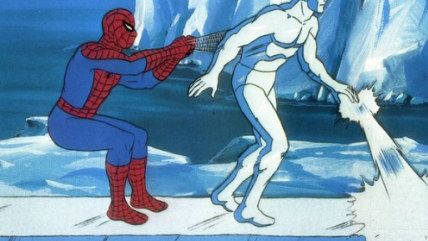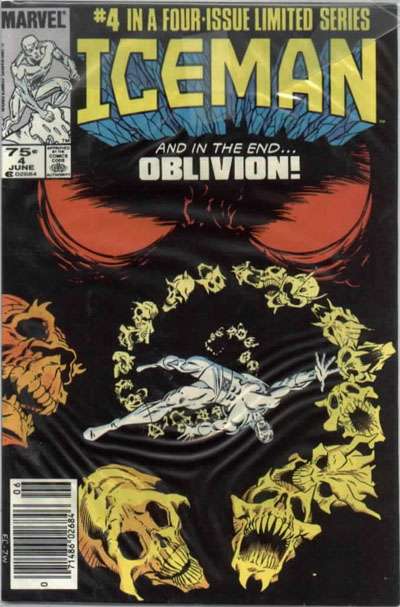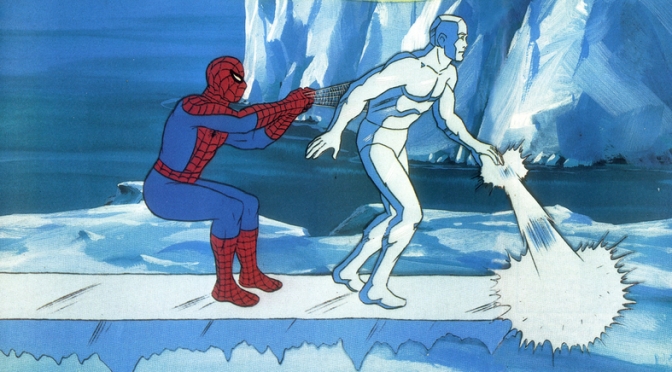Iceman's Gay, Thor's a Lady, and Captain America's Black: The Constant Culture Shifts of Comics Continue
Fretting over diversification of heroes? It's just a sign of the times.


It looks like it took Robert Drake 50 years and several girlfriends to figure out he was gay. Fortunately for him, because he's comic book superhero, he's nevertheless young enough to still get to sow his wild oats.
As had been hinted in a comic book a couple of months ago, Drake, also known as Iceman, one of the original X-Men, is gay. There was not a lot of build up to it. There weren't really hints that Drake questioned his own sexuality throughout his comic history, though there was some fan speculation based on the fact of his troubled history with girlfriends (I always found that an odd argument because every male hero who is not married has troubled histories with girlfriends). Well, there was that time he had a romantic interest who suddenly turned herself into a man. But then it turned out she was actually a sentient nebula who had taken on the form of two humans injured in a car accident. It happens.
In any event, those who have read Marvel comics all their lives know full well that Iceman was neither conceived nor written for decades with the idea that he was gay, regardless whether he openly acknowledged it or acted on it. Even his appearances in the recent X-Men movies seem to be written with the idea that he's heterosexual.
But now he's gay, confirmed in this week's Uncanny X-Men No. 600. In comic book fashion he is forced to confront his sexuality by a teen version who himself who has been sucked into modern day (also the teen version himself was forced to confront his sexuality by the teen version of telepath Jean Grey, who read his mind). The retcon (that's comic speak for "retroactive continuity"—storytelling that alters previously established history) explanation is that Drake decided to suppress dealing with his homosexuality because he had too much other crap to deal with.
That this decision is transparently a choice to fundamentally alter who Drake is for the sake of diversity has both its supporters and its critics. Marvel has actually been introducing gay characters to the comics for years now (as has competitor D.C.). Over time, though, casts of these comic companies have bloated to massive numbers, and it's difficult for new characters to gain traction and develop fan bases.
Periodically, the complexity of the stories and casts gets so large that the comic companies plan out major stories to serve as resets or reboots, clearing a lot of the past storytelling away and setting a new status quo. Marvel is in the middle of doing such a thing right now with a miniseries called Secret Wars. The issue of the X-Men in which Drake is revealed as gay is the final issue of that volume. All the old X-Men-related titles have ended and a new set of series are being launched.
It's happening all over the Marvel universe, and it's not just Iceman seeing changes. Thor has recently lost his hammer, and it has been picked up by occasional romantic interest Jane Foster. Captain America is no longer blond bohunk Steve Rogers. Former sidekick Sam Wilson, who is African American, has taken his place, abandoning his codename of Falcon. Ms. Marvel is now the name used by Muslim Pakistani-American teen Kamala Khan.
It's easy to dismiss this all as a marketing ploy. Well, yes, it is, but superhero comics are a popular culture form of entertainment that partly lives or dies based on successfully understanding its audience and marketing to them.
And it's absolutely not new. Marvel has made gestures toward cultural diversity for ages. Comic fans know full well that part of the metaphor of the X-Men—mutants whose powers originate from genetic abnormalities—was about cultural diversity, civil rights, and fear of the "other." The original Ms. Marvel herself, introduced in the 1970s, was clearly a nod toward the feminist movement of that era.

When I first started collecting comic books back in the early 1980s (actually drawn to them by Iceman's inclusion in the Spiderman and His Amazing Friends Saturday morning cartoon, go figure), genius inventor Tony Stark was not the guy filling out the Iron Man suit. It was James Rhodes, an African-American man, substituting because Stark had become a drunk. Long-time hero Captain Marvel had recently died, and his name was taken by Monica Rambeau, an African-American woman who would go on to lead The Avengers for a stint.
Even at the time the reason there weren't any gay heroes was because the restrictive Comics Code Authority didn't permit references to homosexuality. Nevertheless, writers managed to put in enough subtext to make it clear to smart readers that Canadian hero Northstar and X-Men nemesis Mystique were not, in fact, heterosexual. Northstar would later get huge publicity for Marvel when he came out of the closet, but unlike Iceman, it was pretty obvious to readers that he was gay. The X-Men's metaphor that mutants were hated and feared did a lot of heavy lifting. The vicious climate of human fear of mutants rose in the comic books at the same time the world panicked in the 1980s over the spread of AIDS. Professor Xavier was beaten nearly to death by a mob. At one point in the mid-'80s the X-Men even hid out in San Francisco, where the citizenry seemed to openly welcome them. Eventually the metaphor would be stretched to its breaking point when a disease was introduced that targeted only mutants.
Iceman wouldn't have been my choice to make gay. (I'd have gone with Colossus. What can I say, I have a fondness for big lugs.) But I'm no longer a comic book reader, and I'm certainly no longer the target demographic for the main X-Men comics. As a teen I was, and Marvel (particularly writer Chris Claremont) knew exactly how to appeal to me and my peers. Now that I'm much older, complaining about changes to comic books is like complaining that Taylor Swift is nothing like Cyndi Lauper. Taylor Swift isn't singing to me. Why should she?
Iceman's shift is rather abrupt, but it's certainly not unusual for the comic book environment. Changes (and then occasional reversals of said changes) are embedded in comic book industry DNA, and they're keyed into the zeitgeist of the day.
Below, from ReasonTV, X-Men screenwriter Simon Kinberg explains why we get so attached to characters like Iceman:


Show Comments (77)